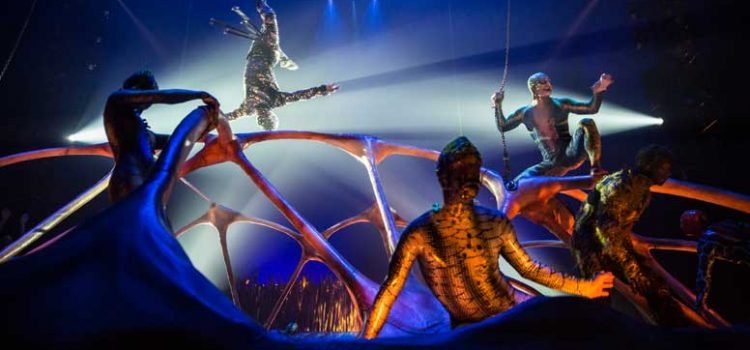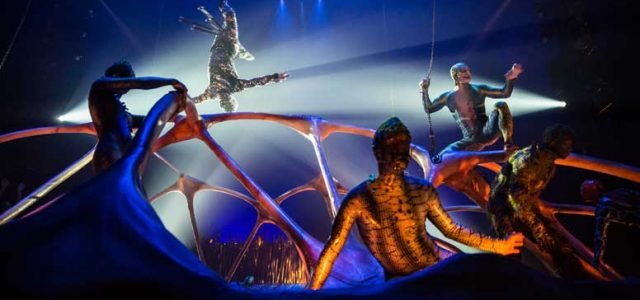

Esi, Ghanian songstress from Cirque du Soleil’s TOTEM interviewed
InterviewUncategorized February 10, 2019 Tayo IDOWU

Cirque du Soleil found Esi Acquaah-Harrison at the end of her contract at Disney. Casting scouts were quickly hooked on her unique style and knew she had the sound they wanted to feature in the upcoming production TOTEM. Ebonyonline.net caught up with the Ghanian songstress to explore Totem, West African life and much more.
EOL: Welcome Esi, please tell us what Cirque du Soleil Totem is about?
Esi: Totem is a show about how one could see the evolution of mankind including some legends, myths and schools of thought about where we may have come from. The interesting thing about Totem is that it presents these ideas while allowing the audience to draw their own thoughts from the performances.
EOL: What are some of the wonderful acts audiences can expect to experience?
Esi : The whole production flows well. The High Bar opening act, Unicycles with Bowls and Duo Trapeze are just a few of the eye-opening performances that Totem has to offer. It just has to be seen to be fully enjoyed. The skill of these acrobats and athletes shows serious dedication that adds beauty to the whole presentation.
EOL: Why in your view is Cirque du Soleil like no other company? What make them unique?
Esi : Well, CDS (Cirque du Soleil) does circus theatre well. The circus part does not include the use of animals, so the skill is entirely on the acrobats. The theatre part adds the flow and finesse to the production that really does set this kind of circus entertainment apart from others and when you add to that the specifically designed lighting and projections not to mention the music, then you have a company that is on the money.
CDS also employs people from all over the world. If you’ve got the skills that they need and they have an opening for you at the time, they’ll employ you. Totem alone has about nineteen to twenty different nationalities employed across its cast and crew.
EOL: Performing must be quite gruelling; can you give us a flavour of your typical day including preparation?
Esi : Performing is very enjoyable! The challenge is to develop and maintain the discipline you need to manage the work load and prepare for eight to ten shows per week. I start warming up at home, often with some stretching when I am ready to get up from bed and then gentle vocal warm up. I don’t time it really, just do what I feel is enough as each day feels different.
I arrive at work two hours before showtime. This allows me about thirty minutes to start make up before the band soundcheck, which is ninety minutes before showtime. After soundcheck I finish doing make up and then have a bite to eat. Vocal warm up carries on intermittently throughout the day until just before showtime.
I also sip water throughout the day. On days when the atmosphere is very dry I do some topical throat steaming as necessary. It’s important to keep vocal folds well hydrated!
EOL: What is it like to be part of such a huge multicultural group? What kind of nationalities do you have?
Esi : I’ve spent much of my life living in London and so a huge multicultural group as there is in Totem does bring its own sense of normality, since London is highly multicultural.
I believe we have nationalities from almost every continent, so examples of the counties would be: Finland (Europe), Mongolia (Asia), Canada (North America), Brazil (South America), Australia (Oceania) and Ghana (my roots and country of birth).
EOL: You say you like to ‘make sounds into language’ can you elaborate more?
Esi : I think if fully put into context, what I was saying at the time in this partially quoted statement, was that when I started the creation process for Totem several years ago, the language of the songs that I was to sing was not a known language but a series of lyrics put together by composers specifically for the show, to appear like a known or real language.
I call it Totem’s created language. When I realised that it was a “created” language, I decided that it was my role to make the lyrics sound authentic (African in the main), by taking meaning from the music and using what the music would give me to express the song.
EOL: Tell us a bit about your experience of performing Rafiki at Disneyland Paris?
Esi : Oh! Rafiki….still with me in many ways. I absolutely enjoyed my experience playing Rafiki. I had three contracts over a period of almost two years. She (in the the park musical at the time) was quite a character and similar to Rafiki in the animated film, disciplined and yet at times mischievous.
I enjoyed playing a role like that within such a good story line and one that I feel can apply to many universally, in terms of …. remembering who you are, remembering that you have a purpose. The experience also introduced me to the use of lighting and automation in shows, which prepared me for the work I am doing in Totem.
EOL: Finally, has your African background influenced your to the entertainment industry? If so how?
Esi : I had the advantage of living some fifteen years of my younger life in Ghana and was encouraged during my secondary (high school) years to join as many school clubs as possible. I joined the school choir as well as one of five school bands a the time.
My school band was somehow spotted at a school pop-chain (musical evening) and were asked to perform on a show. It was called the Mike Eghan show and at the time was Ghana’s equivalent of Parkinson.
Out of that I got my first real session with one of Ghana’s then established musicians as a backing singer in a studio recording, I was sixteen. For sure my background and geography influenced this desire to be in entertainment.
Totem, 12 Jan-26 Feb, Royal Albert Hall, Tickets and info: www.royalalberthall.com or 020 7589 8212















